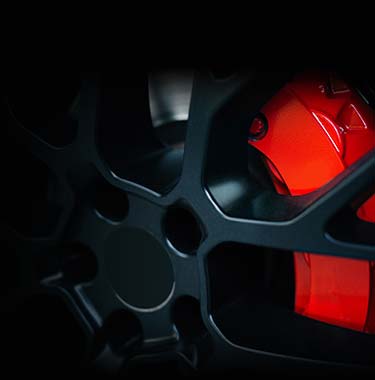Car Brake Service & Repairs
Car brake service
We won’t stop until we’re sure your brakes will stop you
If you’re finding your car doesn’t stop as well as it used to, making some strange sounds or the steering wheel shudders when you brake, it might be time to book your car into your local Bridgestone Select Tyre & Auto Service store for a brake service.
We can diagnose your vehicle’s brake problems and offer brake repair solutions to fit your budget.
Bridgestone Select Tyre & Auto Service stores only install the best and only use components that meet or exceed original equipment standards.
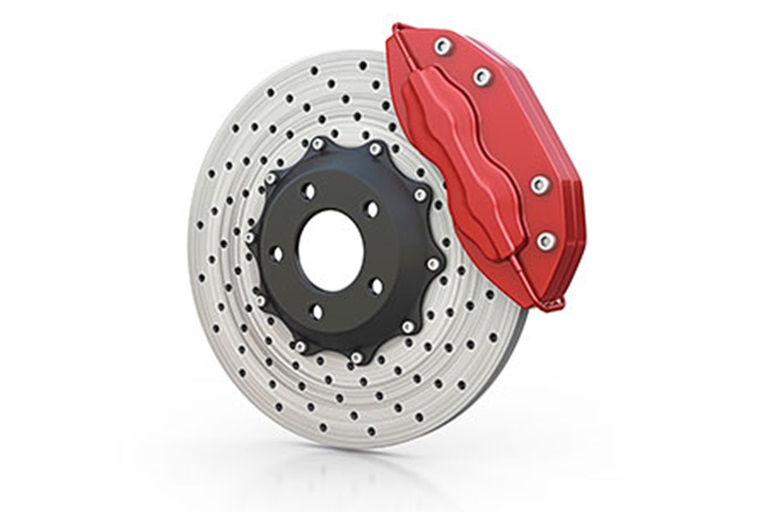
The importance of brakes
The importance of good brakes can never be underestimated. Your brakes are not only responsible for stopping the car, but they also help you decelerate when going downhill, help in avoiding collisions and keep your car stationery when not being used. That’s why it’s so important your brakes are always maintained in good working order.
Just replacing your brake pads every now and then isn’t good enough. There are many parts to a brake system that need checking and, in some cases, replacing. Your local Bridgestone Select Tyre & Auto Service store can take a look at your brakes and advise you on what needs to be done.
Depending on which service package you choose, our qualified mechanics will check the braking system components: from the master cylinder right through to the brake discs and drums and everything in between, including the brake fluid.
Why changing brake fluid is important
Moisture will build up in the brake system over time and when that happens it can react with the materials found in some of the braking components. This in turn leads to erosion with particles contaminating the brake fluid.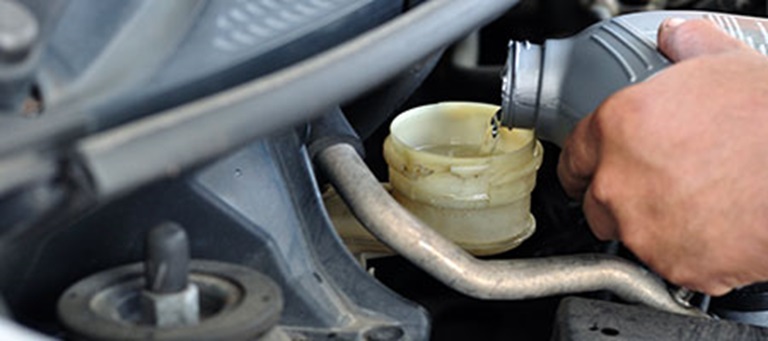
When you bring your car in for a brake inspection, your Bridgestone Select Auto Service technician will inspect and test your vehicle’s brake fluid to determine if you need it changed.
It is a recommendation of most vehicle manufacturers that brake fluid is replaced every 2 years, regardless of the mileage travelled.
Why brake bleeding is important
Have you ever put your foot on the brake pedal and found it to be spongy? When this happens, it can mean air has found its way in to the brake system. The causes can range from a leaky caliper, cylinder or, master cylinder seals, overheating brakes or simply from having had recent work done on your brakes.
Talk to a Bridgestone Select Auto Service technician if you’re experiencing this when braking.
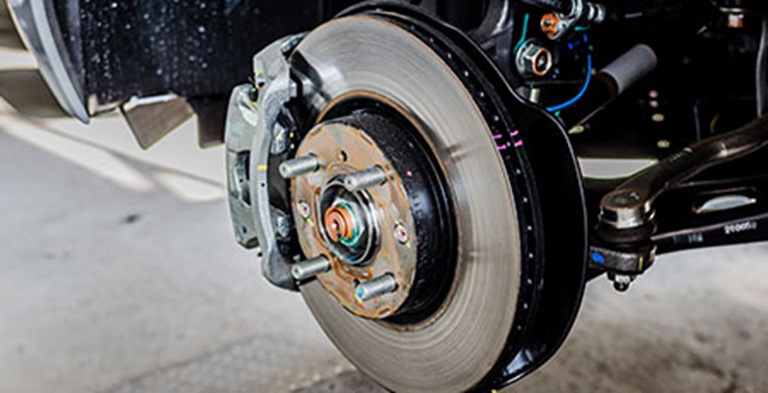
Know your brake parts
Your car’s brakes are a complex hydraulic system composed of many partswhich all work together to stop your car safely, these include:
-
Brake pedal
-
Master cylinder
-
Disc caliper
-
Wheel cylinder assembly
-
Disc pads
-
Shoes
-
Drums
-
Disc rotors
-
Brake fluid and brake fluid lines
-
Parking/hand brake
-
Brake pad wear sensors
-
ABS and traction system modules
Types of brakes
Essentially, there are two main types of braking systems - disc brakes and drum brakes.
-
Disc brakesTheir main components consist of brake pads, rotor, caliper and caliper support.
Disc brakes are the more efficient of the two systems with applications ranging from passengers cars to locomotives and jumbo jets.
Disc brakes are less affected by water, self-adjusting, self-cleaning, less prone to grabbing and stop better -
Drum brakesDrum brakes consist of a backing plate, brake shoes, brake drum, wheel cylinder, return springs and an automatic or self-adjusting system. For many years now, cars have been produced with disc brakes. While front disc brakes have always been a given, sometimes drum brakes are used for the rear brakes.
Essentially, this is because a parking brake was easier to add to a drum system by simply employing a mechanical lever.
Parking brakes must be a separate, totally mechanical system that does not rely on hydraulics.
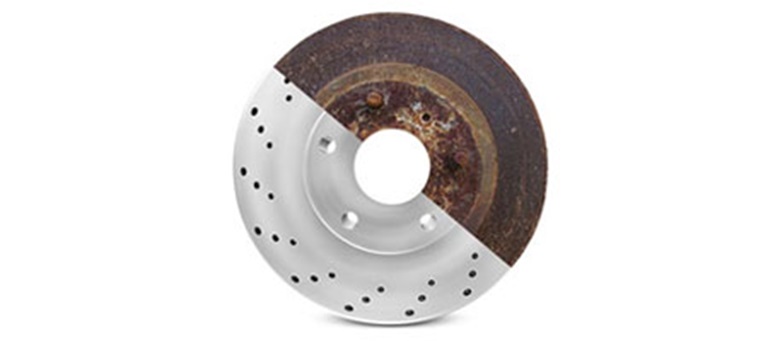
Brake rotor replacement
Have you ever put your foot on the brake pedal and found it to be spongy? When this happens, it can mean air has found its way in to the brake system. The causes can range from a leaky caliper, cylinder or, master cylinder seals, overheating brakes or simply from having had recent work done on your brakes.
Talk to a Bridgestone Select Auto mechanics if you’re experiencing this when braking.
When to replace brake rotors
Driving styles and manufacturer standards vary, as every car and driver is unique. When it comes to brake rotors, replacement is often the best option, while machining may be a suitable alternative depending on the condition of the rotors and the recommendations of a qualified mechanic.
Save yourself time and costly repairs by bringing your car in at the first sign of trouble to your local Bridgestone Select Tyre & Auto Service store and ask them to check on the condition of your brake rotors and whether they need to be replaced or machined. If your brake rotors have significant wear or are warped, they can be resurfaced or replaced.
Parking brake repair
The parking brake system, commonly known as the handbrake, is a fully mechanical and completely separate system that operates on the rear brakes.
Please note some vehicle manufactures now operate an electronic handbrake mechanism
The biggest problem is that the brake cables tend to get corroded and eventually seize up or snap causing the parking brake to become inoperative. Your local Bridgestone Select Tyre & Auto Service store will check the condition and adjustment of your parking brake when you bring your vehicle in for a brake inspection.
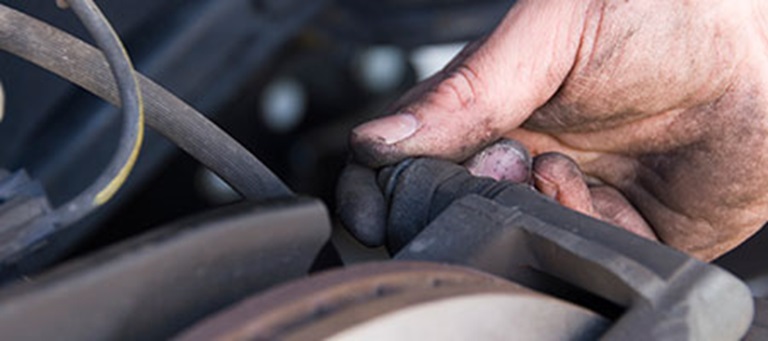
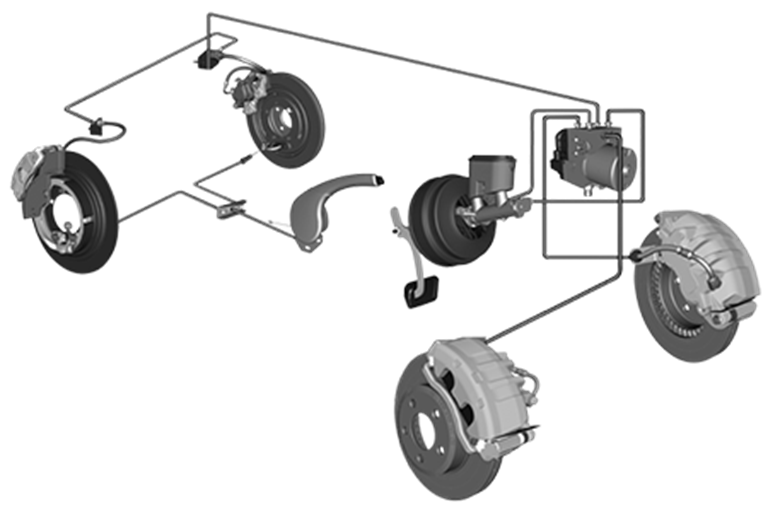
How brakes work
Your vehicle’s brake system is primarily composed of disc brakes in front and either disc or drum brakes in the rear.
These are connected by a system of tubes and hoses linking each brake on a wheel to the master cylinder.
Along with the parking brake, cars may also be fitted with supplementary systems like anti-lock brakes (ABS) and electronic traction control.
Stepping on the brake pedal pushes against a plunger in the master cylinder which in turn forces brake fluid through a series of tubes and hoses to the braking unit at each wheel.
Brake fluid (or any fluid for that matter) can’t be compressed, so it can be directed through the hoses to arrive with the exact same motion and pressure that it started with.
Disc brakes
It is very important that there are no air bubbles in the brake fluid. Air can compress, which causes sponginess to the pedal and severely reduced braking efficiency. If air in the brake system is suspected, it must be bled to remove the air.Drum brakes
On drum brakes — fluid is forced into the wheel cylinder which pushes the brake shoes out so that the friction linings are pressed against the drum (attached to the wheel), forcing it to slow or stop altogether.The benefits of routine maintenance
In both cases above, the friction surfaces of pads (disc brakes) or shoes (drum brakes) convert the forward motion of the vehicle into heat, which is what causes the friction surfaces (linings) of the pads and shoes to eventually wear out and require replacement.Consequently, all brake pads wear out. The various linings of new brake pads can be up to 12mm thick. If they wear down to less than 4mm, it’s time to book into your local Bridgestone Select Tyre & Auto Service store and have them replaced. If they wear down to the metal backing plate, the scraping of metal on the metal surface of the rotor can cause significant damage, and it’s possible that the rotor will have to be replaced, or at the very least machined.
On their own, brake rotors will also wear out over time. Your local Bridgestone Select Tyre & Auto Service store can look up your vehicle specifications and tell you how thick your brake rotors should be. They’ll also check your entire braking system and, if necessary, recommend the required service as part of your routine brake maintenance.
Save the time and expense of costly repairs by having your car brakes, including brake pads, shoes and rotors, checked at regular intervals by your local Bridgestone Select Tyre & Auto Service store.
Troubleshooting
Ever had grinding or squealing brakes? How about a spongy brake pedal or a steering wheel that shakes and shudders?If you've noticed any of these common signs of brake problems, bring your car into your local Bridgestone Select Tyre & Auto Service store and our qualified mechanics will get to the bottom of your car's brake problems.
Available at Bridgestone Select only
Automotive Servicing, Warrant of Fitness Inspections and MechanicalRepairs are available at Bridgestone Select stores only.
